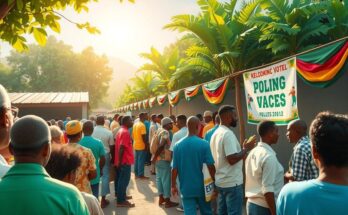Sierra Leone has enacted controversial counter-terrorism laws, raising concerns about civil liberties. Under President Julius Maada Bio, citizens are at risk of being labeled as terrorists for government criticism. Critics assert the laws undermine democracy and suggest the country requires strong institutions instead of repressive legal frameworks.
The recent enactment of counter-terrorism laws in Sierra Leone has raised grave concerns regarding civil liberties and dissent. Under President Julius Maada Bio’s administration, citizens are now at risk of being labeled as terrorists merely for expressing criticism against the government. This shift follows a history where Bio, once a vocal opposition leader, has implemented violent measures against protestors since assuming office in 2018.
With the new legislation passed on March 11, 2025, the ruling Sierra Leone People’s Party (SLPP) is now positioned to justify aggressive actions against political adversaries and social media critics. Observers have noted that this Bill was expedited with minimal public dialogue, largely supported by the opposition All People’s Congress (APC), which is seen as complicit.
The backdrop of this legislative shift reflects a broader global trend, characterized by deteriorating rule of law and human rights, particularly in economically disadvantaged nations. The introduction of such stringent laws threatens to undermine the already fragile democratic values in Sierra Leone, established through significant sacrifice during its past conflicts.
Critics argue that Sierra Leone would be better served by fostering robust, transparent institutions rather than imposing further restrictive measures. The pressing needs of the nation include competent governance that prioritizes the welfare of its citizens to combat poverty effectively.
The implementation of counter-terrorism laws in Sierra Leone poses a serious threat to civil freedoms and democracy. The government’s rush to pass such laws, with the tacit support of opposition parties, signals a troubling shift towards authoritarianism. To safeguard human rights, efforts should focus on creating resilient institutions that represent the people’s interests rather than enforcing draconian measures.
Original Source: www.thesierraleonetelegraph.com




